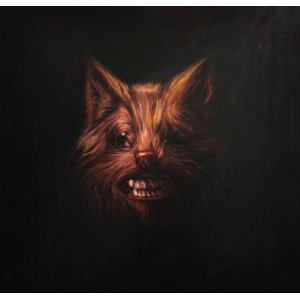Age is wasted on the old. Seriously. Imagine what our precarious, tough-as-nails generation could achieve if it was provided with the kind of cultural opportunities the post-war baby boomers enjoyed. Imagine if all those young artists, academics, media types, and computer geeks who spend their weeks generating reams of meaningless CV fodder just to get on the career ladder were suddenly told that full employment was going to be a priority for the next Labour government. Imagine if 1968 somehow happened again, with tech-savvy, self-reliant, extravagantly knowledgeable hipsters leading the charge instead of fey Dylan-quoting hippies. If the revolution happened tomorrow it would clean up.
But the sad reality is that fiftysomething white guys are hoarding all the money, jobs, and power, while the rest of us are stripping naked and pretending to be Prince Harry. With this dystopian thought in mind, it’s heartening to encounter The Seer, the stellar twelfth album by Swans, an outfit fronted by a fiftysomething white guy intent on giving something back to society while showing the younger generation a thing or two. This is an album that vindicates maturity, long years of toil, cumulative effort, resilience, patience, wisdom. Michael Gira is the village elder we can learn something from, the anti-Tony Blair, the baby boomer who is, by the sound of things, even angrier than we are about the state of the world in 2012.
And what a formidable crescendo of anger. Mirroring the late-peaking trajectory of Gira himself, this is a work that builds and builds across the course of its epic two-hour cycle. ‘Lunacy’ is a demonically, ominously understated opener with clanging instrumentation redolent of the Suspiria soundtrack; Low’s Alan Sparhawk and Mimi Parker intone a two-note motif that sounds like the Fleet Foxes being slowly, beautifully murdered. And after this appropriately portentous introduction – a visual analogue to the satanic-wolf-emerging-from-the-shadows cover art – things just keep getting better.
‘Mother of the World’ is a Slint-esque post-rock odyssey in waltz time; it’s bolstered by a sublimely wayward vocal part that morphs after about four and a half minutes into a laconic Southern Gothic growl-hymn that evokes Beefheart attempting to clamber out of a tomb, or Iggy clambering back into one, or Lou Reed after he’s been in one for a decade or two. ‘The Wolf’ – which clocks in at an atypical one and a half minutes – is an appropriately bluesy, sinister elegy.
But the unequivocal centrepiece and highlight here is the thirty-minute title track. Beginning with a flurry of brass drones and skittering cymbals, ‘The Seer’ careers through multiple stanzas of ambient waste and pulsating, supple improvisation before exploding in a paroxysm of guitar gore, after which it peters out in sputtering grooves over a luscious fifteen-minute period. If a braver, more substantial tune is released in any genre this year we can count ourselves lucky. A swampy, funky postscript, ‘The Seer Returns’, is the icing on the cake, surely the best blues-noise amalgam since Spiritualized’s ‘Cop Shoot Cop’.
Unlike countless of their younger noisenik peers, Swans know how to carve their jams into fluid, delicate birdseye shapes, so that even the most free-form moments on The Seer have a sense of context and place that rules out accusations of amorphousness. (Amongst other things, this is unified concept album of the highest order – though what that concept is remains shrouded in ambient smoke). Even better, the variety of registers on the album creates the powerful impression that this is a collective of people having delirious, exuberant fun as they hammer out their eclectic gothic experiments, hopping across genres and tones with drone acting as a suturing lingua franca. There are several interludes that come as startling surprises: the languid gospel-country of Karen O’s guest vocal on ‘Song for a Warrior’; hoarse balladry of ‘The Daughter Brings the Water’; the unhinged abstract expressionism of ’93. Ave B Blues’ (this is a New York record after all).
Surely the most redemptive, unexpected moment on the album though is penultimate track ‘A Piece of the Sky’. A nuanced city of variegated noise, ‘A Piece of Sky’ is a layered masterpiece that conjures images of Tortoise covering The Band in a Lower East Side speakeasy. Arriving at the pinnacle of this subtle, slowly building magnum opus, it has a feeling of ecstatic release, and should banish any suggestion that this album is a fetishized, doom-for-doom’s sake horror movie. ‘A Piece of the Sky’ proves that all the wrack and wreckage on The Seer has a point: this is a violently purposeful American epic that charts a progress from sinister nihilism to utopian dreaming, a neo-classical work of sophisticated aggression and accomplished grace. Let us now praise older, wiser, angrier men.


